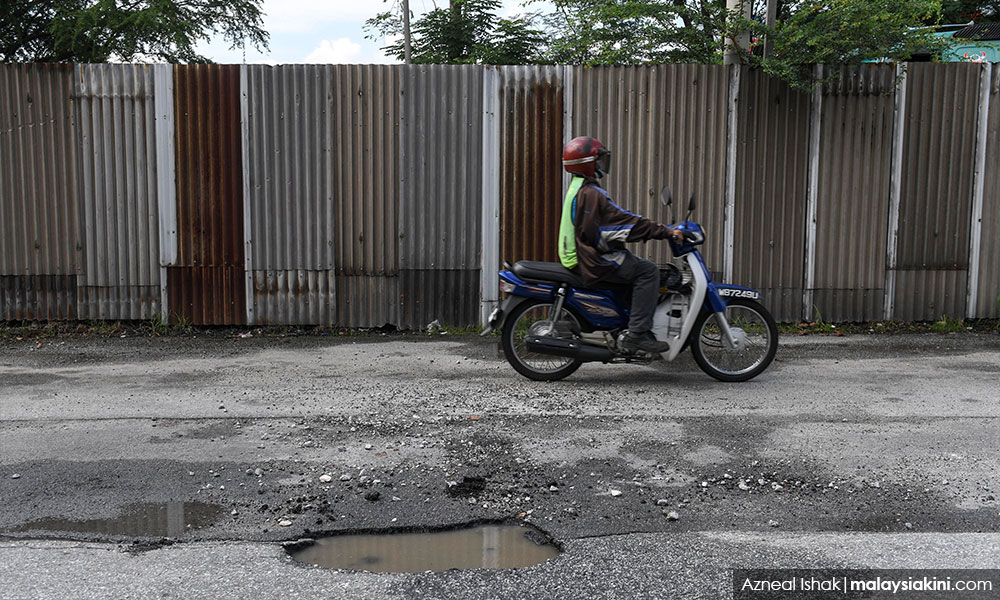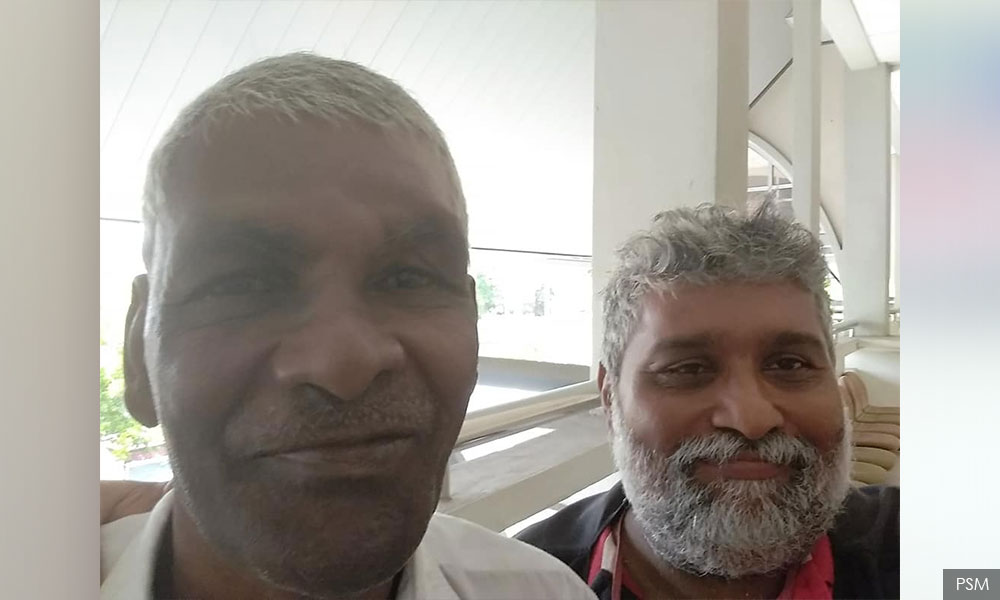I have nothing against Science, Technology, and Innovation Minister Khairy Jamaluddin. In fact, I think he is one of the better ministers we have in the current cabinet. I also wish him a speedy recovery after falling from his bicycle yesterday due to a pothole.
But his experience with a pothole brought my memory back to a case I handled, which all started because of a pothole. Every time I pass that road just after the Petron petrol station, I remember the pothole.
In the early morning before dawn on Oct 29, 2014, at 6am, a security guard, still working at the age of 63, met with a serious accident. Nadarajan was riding a motorbike and because of a pothole, which he could not see in the dark, he fell and was taken to the Kajang Hospital in an unconscious state.
Luckily two bystanders saw the accident and called for an ambulance. His son Ananthan was notified and when he rushed to the hospital, he saw hospital staff members removing his father’s work uniform.
Nobody at that time thought about suing the Kajang Municipal Council (MPKj) because an elderly man was fighting for his life. Till today, nobody has apologised.
Why is a 63-year-old man still working? Yes, poverty, poor wages and a lack of savings force many Malaysians to work even past their retirement age. He worked as a security guard with a firm under Cisco (M) Sdn Bhd, where work hours were 12 hours long. Sometimes he had to work beyond that time if his replacement did not come in.
All his attendance was filled in a logbook - time in and time out - and a supervisor visits occasionally to inspect it. The place he was working at was a Petron petrol station which was under renovation and therefore it was secluded with hardly any other buildings nearby. The nearest eatery was around 45 minutes away and they did not have a break time in between work.
Besides that, there was no water, electricity and even toilet facilities at his workplace. These were the conditions Nadarajan worked in.

After he survived the accident and recovered, Nadarajan lodged a police report on Nov 26, 2014. He also lost his job because, after the accident, his employer was not interested in him. So he went and made an application to the Social Security Organisation (Socso) on Dec 8, 2014.
This was the only avenue available to him when he met me at my service centre in Semenyih. Socso has two major schemes – an accident scheme and invalidity scheme. He did not qualify for the latter as he was over 60, whereas he was entitled to the accident scheme if the accident occurred during work or during his journey to or from there.
He applied for the accident scheme as it had happened on the way back from work and he was wearing a uniform. Nadarajan said that he worked from 4pm till 5.40am. When he left the post, a Pakistani co-worker was there. He signed the logbook as usual. Please note that on that day, he worked more than 12 hours, almost 14 hours.
I contacted his boss and asked him if he could help by filing with Socso and to pay him compensation. His boss was upset that Nadarajan had come to us and complained. He told me that Nadarajan was not his employee. Instead, he claimed Nadarajan was a drunkard who worked when he pleases for pocket money. A stereotype that Indian men are mostly drunkards and should be loaded with toddy.
Nadarajan disputed this. He said he worked there for more than a year and told me the exact location of his work, before his posting at Petron. I asked for witnesses and proof. He then brought in a co-worker who is a UNHCR cardholder named Partheepan.
Legally Partheepan cannot work as refugees are not allowed to under Malaysian law. So he was quite reluctant to help as it could get him into trouble. When I told him what Nadarajan’s boss had claimed, Partheepan got very angry.
He said Nadarajan did not drink nor smoke; he was a very disciplined person. He worked long hours and most times even Partheepan had advised Nadarajan to go home or rest.
Partheepan said that after they were short of one worker, he and Nadarajan's work schedule changed. He worked from 7am till 4pm and Nadarajan worked from 4pm till 5am.
Sadly, Nadarajan’s application to Socso was rejected on March 6, 2015. Socso said it was because it was not a work-related accident as he was not a worker there - and later, the story was that he left his post when he was supposed to leave at only 7am.
It appeared that Socso took the employer's version entirely. It is believed that the employer lied because they failed to make Socso deductions as required by law. So, in order to escape, the convenient story was to say that Nadarajan was not his employee or he was just an odd job worker and not a permanent one.
We were all upset with the Socso findings. Originally there were four security guards, they worked a 12-hour shift and at that time there were only two shifts – 7am till 7pm and 7pm till 7am. Later, one worker left the job and therefore only three were available and the work schedule changed.
At this point, Nadarajan's shift became 4pm till 5.40am. The only rule was that there must be at least one person at the post at all times and they can only leave the post if there was a replacement.
These time changes were known to the employer, where all records were in the attendance book checked by the supervisor Veni. On that fateful day, Nadarajan left the post and at that time the Pakistani co-worker was there. Everything was recorded in the book.
We, therefore, filed a case to Socso appeals board on Dec 14, 2015. This time, Partheepan agreed to give a sworn affidavit and along with my sworn affidavit and Nadarajan’s, we made the appeal.
The appeals board, or known as the tribunal, heard the case on Aug 12 and Oct 14, 2016. Nadarajan was called after two postponements. Sadly they said they did not need me and Partheepan to testify as the employer had already admitted that Nadarajan was a worker.
It is sad that Partheepan's testimony was not recorded. He was a co-worker and could have explained the work schedule. At the hearing, the employer suddenly sprung a twist by saying that the main evidence - the logbook - was lost.
It's hard to believe that the sudden mysterious loss of the book was nothing more than a fabrication by the employer to hide the fact that Nadarajan was a permanent worker and showed his work patterns, which Veni the supervisor would have signed.
Prior to that, we were very confident of winning since the employer had admitted that he did not have clear records and was fumbling on most of the questions. Sadly, the outcome was something else.
On Dec 6, 2016, the appeals board again rejected Nadarajan's claim saying that his work hours were from 7pm till 7am and he had left his post at around 5am without permission. There were no supporting documents to prove the employer’s allegation but this story was apparently bought by the board.
The only way to fight this decision was to take the case to the High Court, which required more money and more running about. If Nadarajan was to win, perhaps he would have received less than RM2,000. But we felt we had to fight this case as a matter of principle and justice.

The case was filed with the High Court in Seremban in April 2017. We tried to get lawyers in Seremban, but most of them were unfamiliar with Sosco-related cases. Luckily, we had Dinesh Muthal, a young lawyer from Petaling Jaya who was willing to do the case pro bono.
But who was Nadarajan fighting against this time in the High Court? For this small case, Socso had employed one of the richest law firms in Malaysia – Skrine & Co. Socso, which is funded by workers and the government, employed one of the richest private firms to fight a case of an elderly man. The fee asked by Skrine was likely many times more than the compensation sought by Nadarajan.
On July 23, 2018, we lost the case at the Seremban High Court. The senior Skrine lawyer said at the High Court that we must raise a substantial question of law and all that our young lawyer had raised were issues that the Socso board chairperson was biased in his decision for not taking into account the missing logbook, for not allowing the Sri Lankan UNHCR cardholder to testify and for not producing any document to prove the employer's allegation. These were fundamental questions.
The High Court judge in Seremban said that Nadarajan’s accident cannot be considered a work accident under Socso as it happened at 6am when his working hours were from 7pm till 7am. It implied that Nadarajan had skipped his work (ponteng).
The judge rejected the case and agreed with the decision of the board, which was that Nadarajan had left his post when his work time only ended at 7am.
Many workers would not even have challenged the case at the High Court. Here we were fortunate because there were lawyers who were willing to take up the case. But nevertheless, this defeat showed how the system and social security can be biased and against the poor in our society.
Nadarajan rode his motorbike from Semenyih to Seremban for this case. After the case, he felt bad and wanted to thank all of us – Dinesh the lawyer, PSM Seremban activist Tina, Sivaranjani and myself.
He said if he had received the money, he wanted to share it with us. I told him that was never our mission, we just wanted him to get justice. He was still trying to explain that he did not "ponteng kerja" (play truant from work) and asked us to check the logbook.
I could only console him by telling him he was a fighter for bringing the case up to this level but the whole system only listened to the employer's version. That was how sad the whole thing was.
It all started because of a pothole. But it reflects the class contradiction in our society. The system itself is full of potholes. How people are forced to work past retirement age, how Socso delivered the second blow and how the courts provided the knockout.
S Arutchelvan is the deputy chairperson of Parti Sosialis Malaysia (PSM). - Mkini
The views expressed here are those of the author/contributor and do not necessarily represent the views of MMKtT.

No comments:
Post a Comment
Note: Only a member of this blog may post a comment.